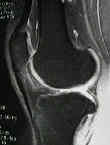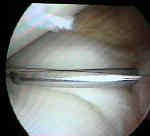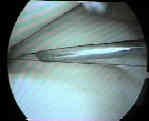
- Anteromedial Portal:
- for visualization of the lateral compartment, and instrumentation of the the medial compartment;
- this portal is located in a manner similar to the anterolateral portal, that is, 1 cm above the medial joint line and 1 cm medial to the edge of the patellar tendon;
- if the portal is to be made adjancent to the patellar tendon, consider placement slightly higher than usual to avoid the fat pad;
- mark out the posterior joint line to ensure that instruments will have adequate access to the posterior meniscus (should meniscal repair be needed);
- generally instruments should not be placed more than 15 deg off of the tibial articular surface;
- use spinal needle to pin point proper entry point
- entry is at intersection of inferior and medial edges of patella;
- direct needle slightly more inferiorly than the arthroscope and direct needle towards posterior horn of medial meniscus;
- medial meniscus is vulnerable during suprameniscal portal placement;
- when using knife, blade should be directed upward when the skin and capsule is incised;
- Posteromedial portal:
- portal is located in small, triangular soft spot formed by postero-medial edge of the femoral condyle & posteromedial edge of tibia;
- location of the portal should be about 1 cm above posteromedial joint line and precisely at posteromedial margin of the femoral condyle;
- w/ angled lens, may visualize PCL & posterior horn of medial meniscus;
- ref:
- Arthroscopic posteromedial visualization of the knee.
- Misc:
- fat pad:
- when fat pad appears prominent and is obstructing visualization, resist the urge to shave away the fat pad;
- instead, attempt to "push and pull" the scope either into the notch or the supra-condylar pouch in order to pull the fat pad anteriorly out of the field of vision
The posteromedial portal in knee arthroscopy: an analysis of diagnostic and surgical utility.




